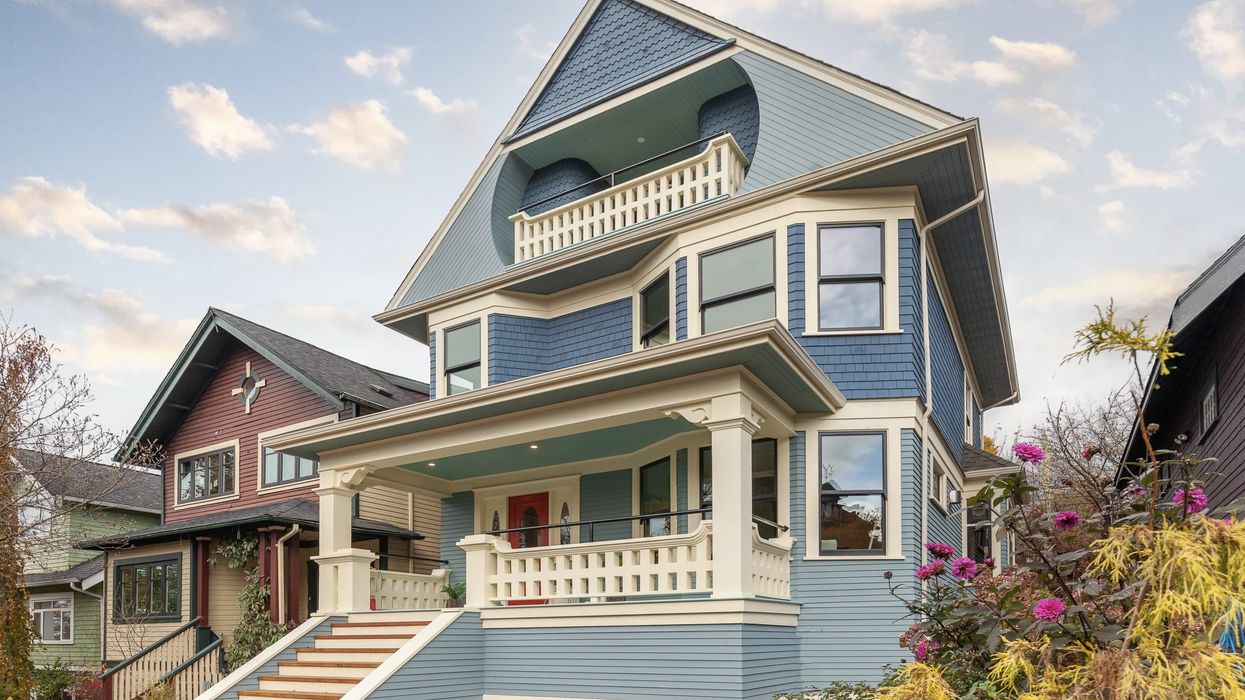When realtor Dwayne Launt listed his client’s property for $2,999,000, he’d expected it to sell for more, because it is a special house, a completely restored Heritage A listed home offering three sprawling levels with a two-bedroom basement suite.
He and the sellers listed the house at 1829 Parker Street, on Vancouver’s east side, in the Commercial Drive neighbourhood, on Monday, Nov. 8 and looked at offers on Tuesday, Nov. 16. He received five, all over asking, and three offers so close together that they were pretty much tied. It was too close to call, so he went back to all five offers and gave them another chance.
Three times, Launt asked them to resubmit new offers because they were coming in too close. Finally, the winning bid came in with just enough extra to clinch the deal, at $3,501,000, purchased by a couple from the neighbourhood. It took eight days to sell, and it completes mid December. The sale also marks a record for the Grandview-Woodland neighbourhood, sending a little tremor of shock throughout the surrounding area.
“Since the property sold, all I’ve done from Tuesday night till now is answer text messages and phone calls from realtors and neighbours,” says Launt.
READ: “Unusual” Corner Lot Home Looking for Record Sale in East Vancouver
He said another home nearby sold this year for $3,055,000, but that one sits on a larger 49.5’ by 122’ lot. The property on Parker is a standard 33’ by 122’ lot.
“We wanted to give them another chance [to bid] because 90% of the people who don’t get the property say, ‘I wish they’d come back and asked [for more], because I have more money to give.’”
Launt doesn’t believe that putting an end to the controversial blind bidding process would bring prices down, however, because even an open auction process can drive people to bid more than they would have.
“I don’t know if it would bring prices down, but it would be more transparent, to know what the other prices were.”
Over four open houses, he showed the 3,305 square foot house built in 1910 to about 115 parties, and several of them returned to view it again. A lot of people who desperately wanted the house didn’t even put in a bid because they knew they couldn’t compete, he says.
“The strategy was to put it on at an appealing price, because it’s such a special house. Even at $3 million that was in the range of the highest price [for the area], but there is no other house like it. And all the people who wanted the house felt the same way. They kept coming back and saying, ‘This is the offer we are giving you. Please come back to us, because there is more money.’
“They know they aren’t going to find another house like this.”
The sale may be an outlier, but it reflects the general direction that detached house sales have been moving throughout the pandemic. The Real Estate Board of Greater Vancouver October market report showed detached homes had reached a benchmark price of $1,850,500. That’s a 20.5% increase from October 2020. The benchmark price for all homes in Metro Vancouver had reached $1,199,400, a 14.7% increase over October 2020.
RE/MAX Canada released a Leger survey in September that showed Canadians attribute high housing prices to too many foreign buyers (48%), low incomes (40%), lack of supply (36%), blind bidding (26%) and lack of effective government policy (25%). Overall, 85% of Canadians surveyed believe there is a housing affordability crisis.
However, Canadians are steadfast in their devotion to home ownership, with 73% agreeing that it’s one of the best investments, according to the survey. Elton Ash, regional executive vice president for RE/MAX Canada, said that 68.5% of Canadians are homeowners.
“We look at Vancouver and Toronto and there are similar stories, just a real lack of inventory and extremely strong demand that really started in July or August 2020 and continued to escalate through the end of the year and continued this year, for several reasons,” says Ash.
READ: Will BC’s New ‘Cooling Off Period’ Really Turn Down the Heat in its Housing Market?
Those reasons, he said, include record low interest rates, professional jobs holding strong, savings rates at record levels, and the desire for bigger spaces as the trend for working remotely grows. Now that inflation is becoming an issue, interest rates will adjust, he adds.
And then there’s the fact that millennials are a massive demographic that is driving demand.
“It’s the greatest wealth transition in history is occurring right now,” says Ash. “Money is transferring from the baby boom to the millennials, and interestingly enough, it’s the second largest generational demographic transferring wealth to what will be the largest generational demographic. And it’s really affecting not only real estate, but all segments of our economy.
“A lot of first-time homebuyers are getting into the market and wanting to take advantage of the opportunity right now before prices increase even further. And Vancouver is the least affordable market in the country.
“Canadians believe in owning a home. Millennials are a huge demographic coming into the marketplace. They were late launchers, but they are coming in strong now. “So, I think my last comment is, Canadians love owning their own home and that’s not going to change.”





















